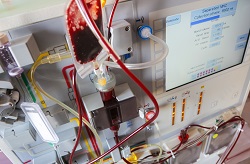Clinical breakthroughs offer young cancer patients hope
Researchers have developed new tests that could improve the diagnosis and treatment of a common form of childhood leukaemia. By tracking special structures in the blood released by cancerous acute lymphoblastic leukaemia cells, scientists believe they will be able to more accurately monitor and treat the disease, saving lives and making more efficient use of medical resources. What makes this discovery so interesting is that, until recently, these special structures - extracellular vesicles - were thought to be inconsequential debris. However, the INTREALL project discovered that cancerous leukaemia cells not only produce but also send these structures to anywhere in the body though blood. This discovery opens up two new research avenues in the treatment of acute lymphoblastic leukaemia (ALL); the possibility of monitoring the progress of the disease by tracking these structures, and the possibility of improving the delivery of drugs by actually combining them with the vesicles. The team also hopes that the vesicles might provide individualised information about tumours, helping doctors to deliver personalised care in the future. ALL is a malignant cancer characterised by an over-production of white blood cells. It predominantly affects children, with fatal relapse in some patients. It is the most common malignant disease in childhood, affecting four in every 100 000 children per year in Europe. Over the past four decades, survival has improved from less than 20 % to over 80 %. Nonetheless, relapse remains a leading cause of mortality in childhood cancer. About 15 to 20 % of patients suffer a relapse of the disease. Relapses are currently treated with intensive chemotherapy and haematopoietic stem cell transplantation (HSCT). Many of these drugs have toxic side-effects and invasive surgical procedures can be painful and stressful for young patients. The INTREALL project therefore sought to bring together European experts with expertise in childhood cancers in order to investigate novel new therapies and to facilitate the world’s largest ALL-focused clinical trial. The project has successfully integrated up to 300 European hospitals as well as innovative small and medium-sized enterprises (SME’s) involved in biotechnology and IT, and has also fostered links with relevant networks on paediatric oncology, drug development and parent organisations. Indeed, the integration of parents into the design, planning and execution of these clinical trials has been an essential factor for ensuring broad acceptance and compliance with the study. Given the rarity of the disease, only a large international cooperative effort could have recruited sufficient patients for effective studies, illustrating once more the importance of pan-European research. These trials have provided an unprecedented opportunity to make new discoveries - such as the role of extracellular vesicles - and to test the efficacy of promising new drugs and novel treatment options that could lead to personalised care for ALL patients. Furthermore, the results of these carefully administered trials will serve as a reference point for future treatment strategies and the monitoring of patient progress. The five year INTREALL project is due for completion at the end of September 2017. For further information please visit: INTREALL project website(opens in new window)
Countries
Germany



